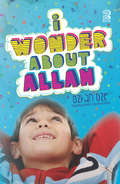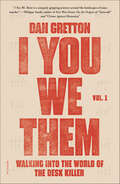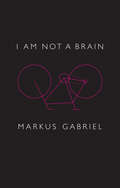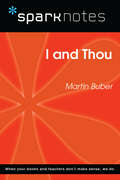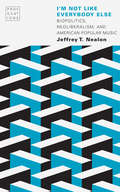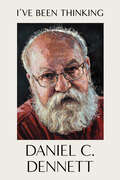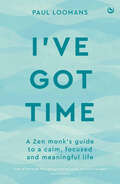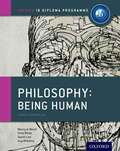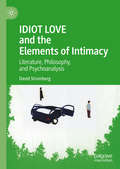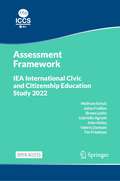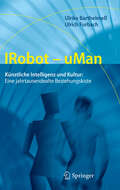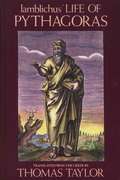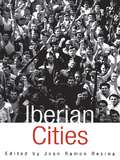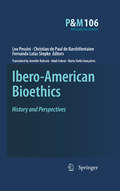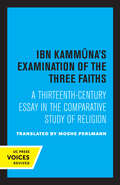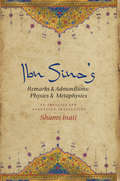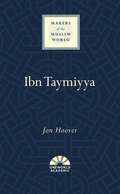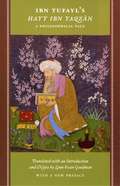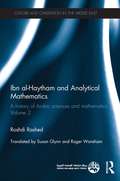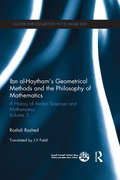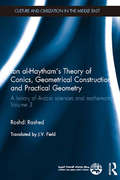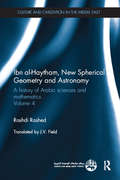- Table View
- List View
I Wonder About Allah
by Selma Ayduz Ozkan OzeHave you ever wondered about Allah? Have you ever wanted to ask why Allah created the universe and humans? Why some people are beautiful, ugly, disabled, or ill? These questions, and many more, are explored inside.Ozkan Oze was born in Turkey in 1974. While at high school, he started working at Zafer Magazine's editorial office in Istanbul and discovered his love of literature and books. Since then he has gone on to become the editor of Zafer Publications Group and continually writes. He is married with two children.
I You We Them, Vol. 1: Walking into the World of the Desk Killer (I You We Them)
by Dan GrettonA “powerful” historical investigation into crimes against humanity—and those who give the orders from the safety of their desks (The Spectator).A Washington Post Notable Nonfiction Book of the YearA Spectator (UK) Best Book of the YearI You We Them is an unprecedented study of the perpetrators of crimes against humanity: the “desk killers” who ordered and directed some of the worst atrocities of the modern era. From Albert Speer’s complicity in Nazi barbarism to Royal Dutch Shell’s role in the murders of Nigerian activist Ken Saro-Wiwa and the rest of the Ogoni Nine, Dan Gretton probes the depths of the figure who, by giving orders, uses paper or a phone or a computer to kill, instead of a gun.Over twenty years, Gretton interviewed survivors and perpetrators, and pored over archives and thousands of pages of testimony. His insight into the psychology of the desk killer is contextualized by the journey he took to penetrate it. Woven into the narrative are his contemplative interludes—perspectives gleaned during walks in the woods, reminiscences about a lost love, and considerations of timeless moral conundrums. The result is a genre-bending work steeped as much in personal reflection as it is in literature and historical and psychological illumination.A synthesis of history, reportage, and memoir, I You We Them is the first volume of a groundbreaking journal of discovery that bears witness to and reckons with the largest and most pressing questions we face.“Gretton raises profoundly unsettling questions about the capacity for doing evil that exists within all of us, and the ways in which the distancing effect of technology allows perpetrators to avoid thinking about the consequences of their actions.” —Irish Times“The subject is tremendously important in a time grown ever darker—and ever more reminiscent of the darkest days in modern world history.” —Kirkus Reviews“A uniquely gripping journey around the landscapes of mass murder.” —Philippe Sands, author of East West Street: On the Origins of Genocide and Crimes against Humanity
I am Not a Brain: Philosophy of Mind for the 21st Century
by Markus GabrielMany consider the nature of human consciousness to be one of the last great unsolved mysteries. Why should the light turn on, so to speak, in human beings at all? And how is the electrical storm of neurons under our skull connected with our consciousness? Is the self only our brain’s user interface, a kind of stage on which a show is performed that we cannot freely direct? In this book, philosopher Markus Gabriel challenges an increasing trend in the sciences towards neurocentrism, a notion which rests on the assumption that the self is identical to the brain. Gabriel raises serious doubts as to whether we can know ourselves in this way. In a sharp critique of this approach, he presents a new defense of the free will and provides a timely introduction to philosophical thought about the self – all with verve, humor, and surprising insights. Gabriel criticizes the scientific image of the world and takes us on an eclectic journey of self-reflection by way of such concepts as self, consciousness, and freedom, with the aid of Kant, Schopenhauer, and Nagel but also Dr. Who, The Walking Dead, and Fargo.
I and Thou
by Walter Kaufmann Martin BuberThe classic work on philosophy and religion, with a wealth of footnotes to clarify obscurities.
I and Thou (SparkNotes Philosophy Guide)
by SparkNotesI and Thou (SparkNotes Philosophy Guide) Making the reading experience fun! SparkNotes Philosophy Guides are one-stop guides to the great works of philosophy–masterpieces that stand at the foundations of Western thought. Inside each Philosophy Guide you&’ll find insightful overviews of great philosophical works of the Western world.
I'm Not Like Everybody Else: Biopolitics, Neoliberalism, and American Popular Music (Provocations)
by Jeffrey T. NealonDespite the presence of the Flaming Lips in a commercial for a copier and Iggy Pop’s music in luxury cruise advertisements, Jeffrey T. Nealon argues that popular music has not exactly been co-opted in the American capitalist present. Contemporary neoliberal capitalism has, in fact, found a central organizing use for the values of twentieth-century popular music: being authentic, being your own person, and being free. In short, not being like everybody else. Through a consideration of the shift in dominant modes of power in the American twentieth and twenty-first centuries, from what Michel Foucault calls a dominant “disciplinary” mode of power to a “biopolitical” mode, Nealon argues that the modes of musical “resistance” need to be completely rethought and that a commitment to musical authenticity or meaning—saying “no” to the mainstream—is no longer primarily where we might look for music to function against the grain. Rather, it is in the technological revolutions that allow biopolitical subjects to deploy music within an everyday set of practices (MP3 listening on smartphones and iPods, streaming and downloading on the internet, the background music that plays nearly everywhere) that one might find a kind of ambient or ubiquitous answer to the “attention capitalism” that has come to organize neoliberalism in the American present. In short, Nealon stages the final confrontation between “keepin’ it real” and “sellin’ out.”
I've Been Thinking
by Daniel C. Dennett"How unfair for one man to be blessed with such a torrent of stimulating thoughts. Stimulating is an understatement." —Richard Dawkins A memoir by one of the greatest minds of our age, preeminent philosopher and cognitive scientist Daniel C. Dennett. Daniel C. Dennett, preeminent philosopher and cognitive scientist, has spent his career considering the thorniest, most fundamental mysteries of the mind. Do we have free will? What is consciousness and how did it come about? What distinguishes human minds from the minds of animals? Dennett’s answers have profoundly shaped our age of philosophical thought. In I’ve Been Thinking, he reflects on his amazing career and lifelong scientific fascinations. Dennett’s relentless curiosity has taken him from a childhood in Beirut and the classrooms of Harvard, Oxford, and Tufts, to “Cognitive Cruises” on sailboats and the fields and orchards of Maine, and to laboratories and think tanks around the world. Along the way, I’ve Been Thinking provides a master class in the dominant themes of twentieth-century philosophy and cognitive science—including language, evolution, logic, religion, and AI—and reveals both the mistakes and breakthroughs that shaped Dennett’s theories. Key to this journey are Dennett’s interlocutors—Douglas Hofstadter, Marvin Minsky, Willard Van Orman Quine, Gilbert Ryle, Richard Rorty, Thomas Nagel, John Searle, Gerald Edelman, Stephen Jay Gould, Jerry Fodor, Rodney Brooks, and more—whose ideas, even when he disagreed with them, helped to form his convictions about the mind and consciousness. Studded with photographs and told with characteristic warmth, I’ve Been Thinking also instills the value of life beyond the university, one enriched by sculpture, music, farming, and deep connection to family. Dennett compels us to consider: What do I really think? And what if I’m wrong? This memoir by one of the greatest minds of our time will speak to anyone who seeks to balance a life of the mind with adventure and creativity.
I've Got Time: A Zen monk's guide to a calm, focused and meaningful life
by Paul LoomansThis isn't a book about making your time more productive... this is a book being more productive with your time. Learn from a Zen monk how to find calm, be more present and get more out of the time you have.Learn from a Zen monk how to turn time pressure into tranquility. Time is our most precious commodity, but all too often it is swallowed up by the frantic pace of work and our always-on connection to the world.But it doesn't have to be that way. Zen monk Paul Loomans is here to share the seven steps you can take to form a new, calmer connection to time while still being able to get everything done.His "Time Surfing" method emphasizes using your intuition to decide what to do, rather than trying to control time itself. You'll learn to:act from inner peacegain perspectiveenjoy your workbecome more productiveand stay healthy.A sense of serenity will arise in every area of your life – for good.
IB Philosophy: Being Human Course Book (Oxford IB Diploma Program)
by Daniel Lee Guy Williams Chris White Nancy Le NezetDeveloped directly with the IB, dedicated assessment support straight from the IB builds confidence, and student samples drive critical thought on constructing strong responses. The most comprehensive coverage of the core content Being Human, this course book will help learners grasp complex philosophical ideas and develop crucial thinking skills <p>• The most comprehensive coverage of the core content Being Human, developed directly with the IB <p>• Engage learners in the course, with excerpts from a range of philosophers spurring critical discussion <p>• Help students understand exam achievement levels and progress attainment with clear student samples <p>• Assessment support straight from the IB cements assessment potential <p>• Support all learning styles and simplify complex philosophical ideas using clear visuals and illustrations <p>• Reinforce all key ideas with integrated activities helping extend and deepen understanding <p><p>IB Diploma Course Books are essential resource materials designed in cooperation with the IB to provide students with extra support through their IB studies. Course Books provide advice and guidance on specific course assessment requirements, mirroring the IB philosophy and providing opportunities for critical thinking.
IDIOT LOVE and the Elements of Intimacy: Literature, Philosophy, and Psychoanalysis
by David StrombergThis book turns our search for intimacy on its head, suggesting that our way to creativity in love may be through idiocy. The book takes its readers on a journey through the work of Plato and Melanie Klein in theorizing the dynamics of intimacy while exploring some of the paradoxical aspects of love in works by Fyodor Dostoevsky and French filmmaker Catherine Breillat. Revisiting core concepts of how we think about relationships, the book lays out a model for relational breakdown—the idiot lovecycle—in which we are constantly in the flux between seeing ourselves and seeing the other. Effecting close readings of literary, philosophical, and psychoanalytical sources, the book draws on parallels between these fields of inquiry while tracing their shared intellectual genealogy, suggesting that the tension between Narcissus and Cassandra, with its inherent conflicts, is also the space through which love emerges from intimacy.
IEA International Civic and Citizenship Education Study 2022 Assessment Framework
by Julian Fraillon John Ainley Wolfram Schulz Tim Friedman Bruno Losito Gabriella Agrusti Valeria DamianiThis open access publication outlines the underlying framework for gathering data on civic knowledge, attitudes, and engagement as well as contextual information, and it describes the assessment design for the International Association for the Evaluation of Educational Achievement’s (IEA) International Civic and Citizenship Education Study 2022.The IEA International Civic and Citizenship Study (ICCS) investigates how young people are prepared to undertake their roles as citizens in a range of countries in the second decade of the 21st century. ICCS 2022 is a continuation of two earlier IEA studies, ICCS 2009 and ICCS 2016, and, for the first time, this survey includes the option of a computer-based assessment. Responding to enduring and emerging challenges of educating young people in a world where contexts of democracy and civic participation continue to change, the study addresses issues related to young people’s engagement through digital technologies, migration and diversity, perceptions of the political system, global citizenship, and education for sustainable development. Over the past 50 years, IEA has conducted comparative research studies in a range of domains focusing on educational policies, practices, and outcomes in many countries around the world. Prior to ICCS 2022, IEA conducted four international comparative studies of civic and citizenship education, with a first survey implemented in 1971, a second one in 1999, third in 2009 and fourth in 2016. ICCS 2022 data will allow education systems to evaluate the strengths of educational policies, both internationally, and in a regional context, and to measure progress in achieving critical components of their educational policy agendas.
IRobot - uMan
by Ulrich Furbach Ulrike BarthelmeßWarum werden Roboter oft als bedrohlich empfunden? Können künstliche Systeme Emotionen und Bewusstsein haben? Die Autoren gehen von der These aus, dass die Literatur- und Geistesgeschichte uns helfen kann, aktuelle Entwicklungen der Robotik unvoreingenommen zu betrachten. Denn ob es um mittelalterliche Mythen, androide Roboter der Romantik, die Aufklärung oder die Entwicklung der künstlichen Intelligenz geht, stets stellt sich die Frage nach dem, was der Mensch ist, was sein Bewusstsein ausmacht und was ihn von anderen Wesen unterscheidet.
Iamblichus' Life of Pythagoras
by Thomas TaylorAuthentic memoirs of the life of Pythagoras--the father of philosophy and the inventor of geometry--hold the great interest for every lover of wisdom. Iamblichus' biography is universally acknowledged as deriving from sources of the highest antiquity. Its classic translation by Thomas Taylor was first printed in 1818 and is once again brought to light in this edition. During Iamblichus' life, the depth and sublimity of his writing and discourse attracted a multitude of associates and disciples from all parts of the world. The Emperor Julian wrote of him, "that he was posterior indeed in time, but not in genius, to Plato," and all the Platonists who succeeded him honored him with the epithet of "divine." Iamblichus' account of the life of Pythagoras begins with the great philosopher's birth on the island of Samos, his youth, and his wide renown in Greece. It briefly covers his early travels and his studies with the philosophers Anaximander and Thales, his twenty-two years of instruction in the temples of Egypt, and his initiation into the Egyptian and Babylonian mysteries. The later life and work of Pythagoras are richly elaborated, with humorous and profound anecdotes illustrating his philosophy and providing a unique view of community life under his tutelage in Crotona. Included are excerpts from his teachings on harmonic science, dietetic medicine, friendship, temperance, politics, parenthood, the soul's former lives and many other topics. The book also contains substantial sections on the Fragments of the Ethical Writings (the work of very early Pythagoreans) and the Pythagoric Sentences.
Iberian Cities (Hispanic Issues #Vol. 22)
by Joan Ramon ResinaThis multi-disciplinary study explores the explosion of cultural, social, linguistic, and architectural development in urban and rural settlements on and surrounding the Iberian peninsula during the 20th century.
Ibero-American Bioethics
by Adail Sobral Maria Stella Gonçalves Fernando Lolas Stepke Jennifer Bulcock Christian de Paul de Barchifontaine Léo PessiniThis volume is the first English-language book-length text to trace the development of bioethics in the Ibero-American context. Coverage is given to many particular countries within Latin America with an aim to present the historical development of bioethics therein. This history takes place against the backdrop of a tumultuous period of time in the history of Latin America. The volume also discusses the relationship of bioethics in Latin America to questions and issues in Roman Catholic moral theology and philosophy. Moreover, it specifically touches on how these issues affect women in the region. "Ibero-American Bioethics: History and Perspectives" is a landmark work, collecting the voices of those who participated in the founding and development of bioethics in Latin America, the Caribbean, and the Iberian Peninsula. The volume offers the reader a cluster of perspectives on the various births of bioethics in this region. The essays in part are irreplaceable first-person voices that give an account of how bioethics took shape within the Spanish and Portuguese cultures both in Europe and in the Americas. As such, the volume is a collection of primary sources, otherwise not available in English, that presents historical panoramas and explores the new perspectives born of the different phases of bioethics in Ibero-America - from its assimilation of bioethics to its creation of its own authentic voices. The volume also encompasses critical reflections from this region on the quite different ways in which its local bioethics have taken shape. As such, this volume also offers an introduction into the quite different concerns that frame and direct bioethics in the cultural context of Ibero-America. The book gives a rich, deep, broad, and pluralist presentation of Ibero-American bioethics and its contribution to the international phenomenon of bioethics. It is a volume for all readers interested in bioethics, Ibero-American studies, and international approaches to health care policy.
Ibn Gabirol's Theology of Desire
by Sarah PessinDrawing on Arabic passages from Ibn Gabirol's original Fons Vitae text, and highlighting philosophical insights from his Hebrew poetry, Sarah Pessin develops a "Theology of Desire" at the heart of Ibn Gabirol's eleventh-century cosmo-ontology. She challenges centuries of received scholarship on his work, including his so-called Doctrine of Divine Will. Pessin rejects voluntarist readings of the Fons Vitae as opposing divine emanation. She also emphasizes Pseudo-Empedoclean notions of "Divine Desire" and "Grounding Element" alongside Ibn Gabirol's use of a particularly Neoplatonic method with apophatic (and what she terms "doubly apophatic") implications. In this way, Pessin reads claims about matter and God as insights about love, desire, and the receptive, dependent, and fragile nature of human being. Pessin reenvisions the entire spirit of Ibn Gabirol's philosophy, moving us from a set of doctrines to a fluid inquiry into the nature of God and human being - and the bond between God and human being in desire.
Ibn Kammuna's Examination of the Three Faiths: A Thirteenth-Century Essay in the Comparative Study of Religion
by Moshe PerlmannThis title is part of UC Press's Voices Revived program, which commemorates University of California Press’s mission to seek out and cultivate the brightest minds and give them voice, reach, and impact. Drawing on a backlist dating to 1893, Voices Revived makes high-quality, peer-reviewed scholarship accessible once again using print-on-demand technology. This title was originally published in 1971.
Ibn Sina's Remarks and Admonitions: Physics and Metaphysics
by Shams C. InatiAl-Isharat wat-Tanbihat ( Remarks and Admonitions) is one of the most mature and comprehensive philosophical works of Ibn Sina (Avicenna, 980--1037). Grounded in an exploration of logic (which Ibn Sina described as the gate to knowledge) and happiness (the ultimate human goal), the text illuminates the divine, the human being, and the nature of things through a wide-ranging discussion of topics. The sections of Physics and Metaphysics deal with the nature of bodies and souls as well as existence, creation, and knowledge. Especially important are Ibn Sina's views of God's knowledge of particulars, which generated much controversy in medieval Islamic and Christian philosophical and theological circles and provoked a strong rejection by eleventh-century philosopher al-Ghazali.This book provides the first annotated English translation of Physics and Metaphysics and edits the original Arabic text on which the translation is based where it is corrupt or incomprehensible. It begins with a detailed analysis of the text, followed by a translation of the three classes or groups of ideas in the Physics (On the Substance of Bodies; On the Directions and Their Primary and Secondary Bodies; and On the Terrestrial and Celestial Souls) and the four in the Metaphysics (On Existence and Its Causes; Creation Ex Nihilo and Immediate Creation; On Ends, on Their Principles, and on the Arrangement [of Existence]; and On Abstraction. The Metaphysics closes with a significant discussion of the concepts of providence, good, and evil, which Ibn Sina uses to introduce a theodicy.Researchers, faculty, and students in philosophy, theology, religion, and intellectual history will find in this work a useful and necessary source for understanding Ibn Sina's philosophical thought and more generally the medieval Islamic and Christian study of nature, the world beyond, psychology, God, and the concept of evil.
Ibn Sina’s Remarks and Admonitions: An Analysis and Annotated Translation
by Shams C. InatiAl-Isharat wal-Tanbihat (Remarks and Admonitions) is one of the most mature and comprehensive philosophical works by Ibn Sina (Avicenna, 980–1037). Grounded in an exploration of logic (which Ibn Sina described as the gate to knowledge) and happiness (the ultimate human goal), the text illuminates the divine, the human being, and the nature of things through a wide-ranging discussion of topics. The sections of Physics and Metaphysics deal with the nature of bodies and souls as well as existence, creation, and knowledge. Especially important are Ibn Sina's views of God's knowledge of particulars, which generated much controversy in medieval Islamic and Christian philosophical and theological circles and provoked a strong rejection by eleventh-century philosopher al-Ghazali.This book provides the first annotated English translation of Physics and Metaphysics and edits the original Arabic text on which the translation is based. It begins with a detailed analysis of the text, followed by a translation of the three classes or groups of ideas in the Physics (On the Substance of Bodies, On the Directions and Their Primary and Secondary Bodies, and On the Terrestrial and Celestial Souls) and the four in the Metaphysics (On Existence and Its Causes, Creation Ex Nihilo and Immediate Creation, On Ends, on Their Principles, and on the Arrangement [of Existence], and On Abstraction. The Metaphysics closes with a significant discussion of the concepts of providence, good, and evil, which Ibn Sina uses to introduce a theodicy.Researchers, faculty, and students in philosophy, theology, religion, and intellectual history will find in this work a useful and necessary source for understanding Ibn Sina's philosophical thought and, more generally, the medieval Islamic and Christian study of nature, the world beyond, psychology, God, and the concept of evil.
Ibn Taymiyya (Makers of the Muslim World #73)
by Jon HooverIbn Taymiyya (1263–1328) of Damascus was one of the most prominent and controversial religious scholars of medieval Islam. He called for jihad against the Mongol invaders of Syria, appealed to the foundational sources of Islam for reform, and battled against religious innovation. Today, he inspires such diverse movements as Global Salafism, Islamic revivalism and modernism, and violent jihadism. This volume synthesizes the latest research, discusses many little-known aspects of Ibn Taymiyya&’s thought, and highlights the religious utilitarianism that pervades his activism, ethics, and theology.
Ibn Tufayl's Hayy Ibn Yaqzan: A Philosophical Tale
by Ibn Tufayl Lenn Evan GoodmanThe Arabic philosophical fable Hayy Ibn Yaqzanis a classic of medieval Islamic philosophy. Ibn Tufayl (d. 1185), the Andalusian philosopher, tells of a child raised by a doe on an equatorial island who grows up to discover the truth about the world and his own place in it, unaided--but also unimpeded--by society, language, or tradition. Hayy's discoveries about God, nature, and man challenge the values of the culture in which the tale was written as well as those of every contemporary society. Goodman's commentary placesHayy Ibn Yaqzanin its historical and philosophical context. The volume features a new preface and index, and an updated bibliography. "One of the most remarkable books of the Middle Ages. "--Times Literary Supplement "An enchanting and puzzling story. . . . The book transcends all historical and cultural environments to settle upon the questions of human life that perpetually intrigue men. "--Middle EastJournal "Goodman has done a service to the modern English reader by providing a readable translation of a philosophically significant allegory. "--Philosophy East and West "Add[s] bright new pieces to an Islamic mosaic whose general shape is already known. "--American Historical Review
Ibn al-Haytham and Analytical Mathematics: A History of Arabic Sciences and Mathematics Volume 2 (Culture and Civilization in the Middle East)
by Roshdi RashedThis volume provides a unique primary source on the history and philosophy of mathematics and the exact sciences in the mediaeval Arab world. The second of five comprehensive volumes, this book offers a detailed exploration of Arabic mathematics in the eleventh century as embodied in the legacy of the celebrated polymath al-Hasan ibn al-Haytham. Extensive analyses and annotations from the eminent scholar, Roshdi Rashed, support a number of key Arabic texts from Ibn al-Haytham’s treatises in infinitesimal mathematics, translated here into English for the first time. Rashed shows how Ibn al-Haytham’s works demonstrate a remarkable mathematical competence in mathematical subjects like the quadrature of the circle and of lunes, the calculation of the volumes of paraboloids, the problem of isoperimetric plane figures and solid figures with equal surface areas, along with the extraction of square and cubic roots. The present text is complemented by the first volume of A History of Arabic Sciences and Mathematics, which focused on founding figures and commentators in the ninth and tenth centuries Archimedean-Apollonian mathematical ‘School of Baghdad’. This constellation of works illustrates the historical and epistemological development of ‘infinitesimal mathematics’ as it became clearly articulated in the oeuvre of Ibn al-Haytham. Contributing to a more informed and balanced understanding of the internal currents of the history of mathematics and the exact sciences in Islam, and of its adaptive interpretation and assimilation in the European context, this fundamental text will appeal to historians of ideas, epistemologists and mathematicians at the most advanced levels of research.
Ibn al-Haytham's Geometrical Methods and the Philosophy of Mathematics: A History of Arabic Sciences and Mathematics Volume 5 (Culture and Civilization in the Middle East)
by Roshdi Rashed and J. V. FieldThis fifth volume of A History of Arabic Sciences and Mathematics is complemented by four preceding volumes which focused on the main chapters of classical mathematics: infinitesimal geometry, theory of conics and its applications, spherical geometry, mathematical astronomy, etc. This book includes seven main works of Ibn al-Haytham (Alhazen) and of two of his predecessors, Thābit ibn Qurra and al-Sijzī: The circle, its transformations and its properties; Analysis and synthesis: the founding of analytical art; A new mathematical discipline: the Knowns; The geometrisation of place; Analysis and synthesis: examples of the geometry of triangles; Axiomatic method and invention: Thābit ibn Qurra; The idea of an Ars Inveniendi: al-Sijzī. Including extensive commentary from one of the world’s foremost authorities on the subject, this fundamental text is essential reading for historians and mathematicians at the most advanced levels of research.
Ibn al-Haytham's Theory of Conics, Geometrical Constructions and Practical Geometry: A History of Arabic Sciences and Mathematics Volume 3 (Culture and Civilization in the Middle East)
by Roshdi RashedTheory of Conics, Geometrical Constructions and Practical Geometry: A History of Arabic Sciences and Mathematics Volume 3, provides a unique primary source on the history and philosophy of mathematics and science from the mediaeval Arab world. The present text is complemented by two preceding volumes of A History of Arabic Sciences and Mathematics, which focused on founding figures and commentators in the ninth and tenth centuries, and the historical and epistemological development of ‘infinitesimal mathematics’ as it became clearly articulated in the oeuvre of Ibn al-Haytham. This volume examines the increasing tendency, after the ninth century, to explain mathematical problems inherited from Greek times using the theory of conics. Roshdi Rashed argues that Ibn al-Haytham completes the transformation of this ‘area of activity,’ into a part of geometry concerned with geometrical constructions, dealing not only with the metrical properties of conic sections but with ways of drawing them and properties of their position and shape. Including extensive commentary from one of world’s foremost authorities on the subject, this book contributes a more informed and balanced understanding of the internal currents of the history of mathematics and the exact sciences in Islam, and of its adaptive interpretation and assimilation in the European context. This fundamental text will appeal to historians of ideas, epistemologists and mathematicians at the most advanced levels of research.
Ibn al-Haytham, New Astronomy and Spherical Geometry: A History of Arabic Sciences and Mathematics Volume 4 (Culture and Civilization in the Middle East)
by Roshdi RashedThis volume provides a unique primary source on the history and philosophy of mathematics and science from the mediaeval Arab world. The fourth volume of A History of Arabic Sciences and Mathematics is complemented by three preceding volumes which focused on infinitesimal determinations and other chapters of classical mathematics. This book includes five main works of the polymath Ibn al-Haytham (Alhazen) on astronomy, spherical geometry and trigonometry, plane trigonometry and studies of astronomical instruments on hour lines, horizontal sundials and compasses for great circles. In particular, volume four examines: the increasing tendency to mathematize the inherited astronomy from Greek sources, namely Ptolemy's Almagest; the development of celestial kinematics; new research in spherical geometry and trigonometry required by the new kinematical theory; the study on astronomical instruments and its impact on mathematical research. These new historical materials and their mathematical and historical commentaries contribute to rewriting the history of mathematical astronomy and mathematics from the 11th century on. Including extensive commentary from one of the world’s foremost authorities on the subject, this fundamental text is essential reading for historians and mathematicians at the most advanced levels of research.
